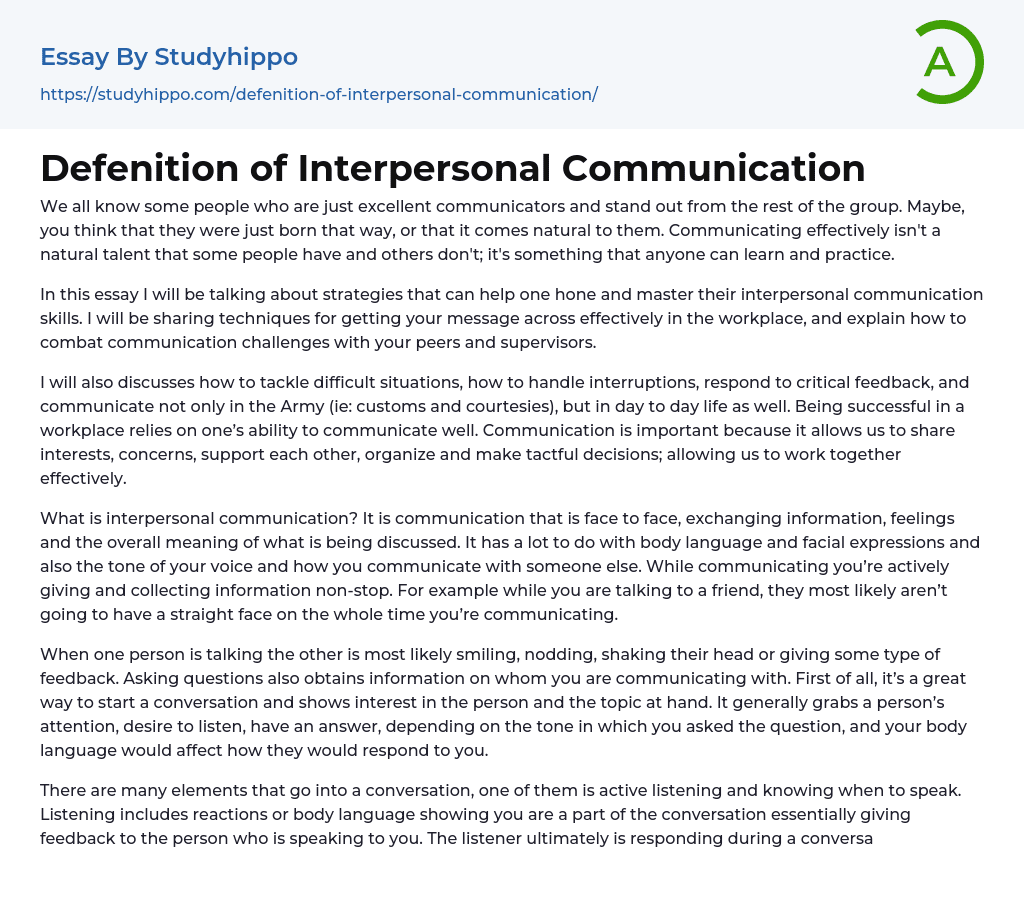The primary objective of this essay is to explore approaches aimed at enhancing and mastering interpersonal communication skills. While some individuals may appear to possess a natural talent or find it effortless, effective communication is not limited to a select few. Instead, it is a skill that can be learned and improved by anyone.
The speaker in this presentation will discuss effective communication techniques in the workplace and strategies for addressing communication challenges with peers and supervisors. They will also cover approaches to handling difficult situations, managing interruptions, responding to critical feedback, and communicating not only within the Army but also in everyday life. Effective communication is crucial for success at work as it enables individuals to share interests, concerns, provide support, coordinate tasks, and make thoughtful decisions that promote effective teamwork. Interpersonal communication involves face-to-face exchanges of i
...nformation, emotions, and overall meaning in discussions. It heavily relies on body language, facial expressions, tone of voice, and how individuals interact with others.
During communication, there is a continuous exchange of information between both parties. For example, when conversing with a friend, their facial expressions may vary during the conversation. While one person is speaking, the other can demonstrate engagement by smiling, nodding, shaking their head or providing feedback. Furthermore, asking questions aids in gathering more information about the individual you are communicating with.
Initiating a conversation is an effective way to demonstrate interest in both the individual and the subject matter, capturing their attention and potentially eliciting a response. The manner in which you pose your question and express your body language can impact how they react. Actively engaging by listening attentively, displaying reactions, and using appropriate body
language is a crucial aspect of communication that showcases involvement and provides feedback. Nonetheless, it is important to discern when to interject without interrupting the speaker. Although seemingly insignificant in our daily interactions with others, we may be unaware if we possess a tendency to interrupt others. This innate inclination often arises if we are frequently in the presence of children.
When you are engaged in an adult conversation, a child may interrupt by yelling or screaming, seeking attention without understanding the concept of communication beyond making noise. Having good manners facilitates smooth conversations as it promotes politeness and respect towards the other person. This entails pausing to allow them to respond and vice versa. Manners are closely tied to customs and courtesies, which can be applicable when communicating with a supervisor. In such situations, one generally maintains respect and exhibits active listening by responding when asked a question or when the supervisor pauses, expecting feedback.
Having good manners, customs, and courtesies is important. However, it is inevitable to encounter individuals who try to jump in on overheard conversations or interrupt what you're saying. To prevent interruptions without making the conversation incoherent, there are strategies that can be used.
Nonverbal signals like raising your eyebrows, slowing down speech or making it quieter, and adopting a relaxed body position can discourage interruptions. These signals communicate that you do not wish to be interrupted. For instance, if someone tries to take over the conversation, using body language can signal them to be quiet and allow you to finish speaking.
Maintaining eye contact for a longer period of time than just a glance - similar to when giving a presentation with sidebar
comments - also helps deter interruptions.
By staring intently at that person, they will understand that you are not finished speaking and will stop communicating. Another method is to confront them with the question, "Can I finish?" This straightforward approach can effectively convey your message, especially depending on your tone of voice and body language. When it comes to communication in challenging situations, I have always been interested in studying different individuals and how they handle constructive criticism. I have already observed this a lot while being here at the NCOA, whether during AARs or in daily interactions with my peers.
When individuals encounter criticism, they frequently react defensively and with anger, sometimes even retaliating against those who offer help. However, it is crucial that we acknowledge the benefits of receiving criticism. It helps us identify our weaknesses so that we can enhance our skills, relationships, work performance, and leadership qualities. Moreover, we should remember that the person giving feedback may feel anxious about expressing their thoughts on areas needing improvement and might struggle to effectively convey their message.
When receiving feedback, it is important to listen and reflect on it. It's crucial to remember that no one is perfect. If you think the feedback will help you improve, make sure to thank the person for sharing their concerns and trying to help you become more effective. If you don't fully understand the feedback, feel free to ask questions and try rephrasing it for clarity. Being an active listener is essential when receiving constructive criticism from peers, subordinates, or superiors. Ultimately, by observing others, self-reflecting, and actively striving to understand communication, you will develop a greater awareness of
the message being conveyed and received.
Effective communication is essential as it enables us to exchange ideas, express concerns, provide support, coordinate activities, and reach sensible decisions. This collaboration fosters efficient teamwork in all circumstances.




